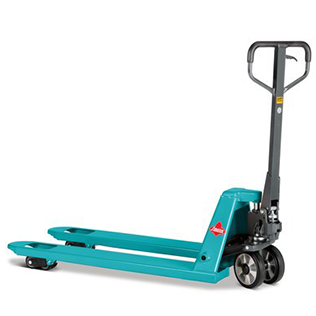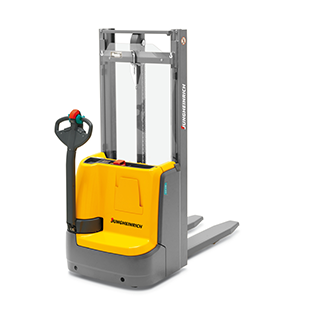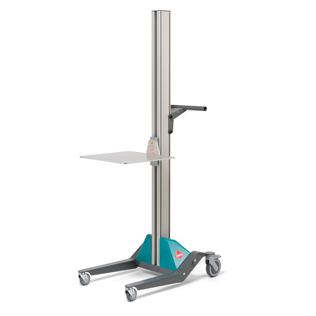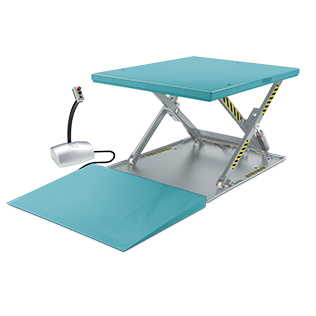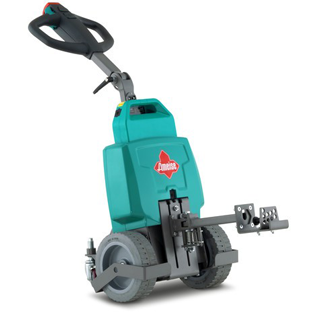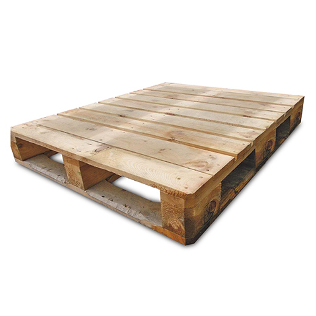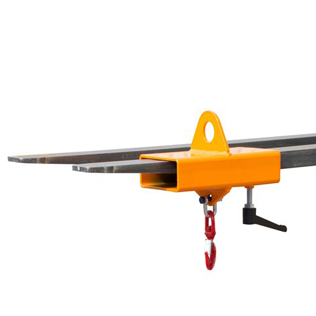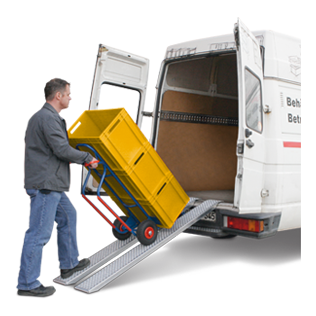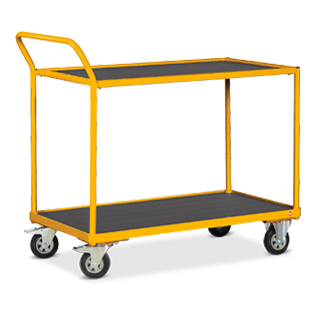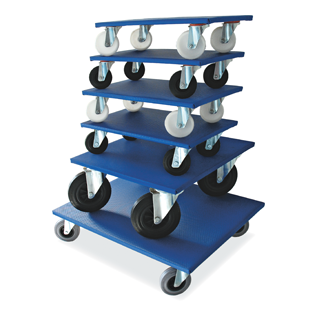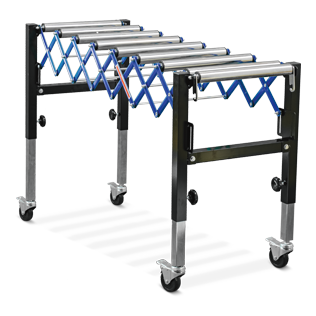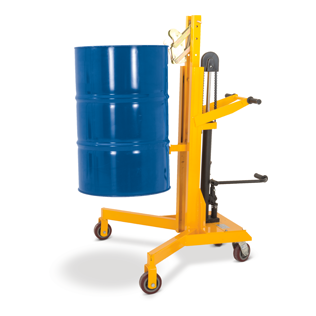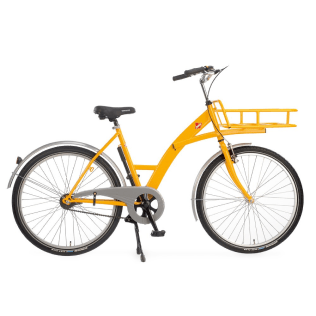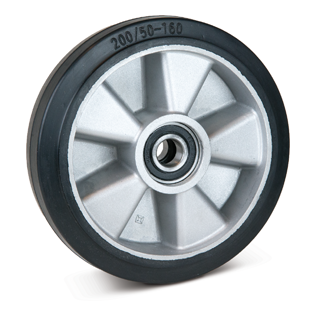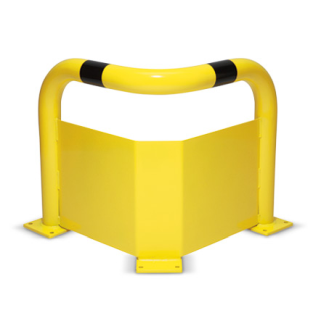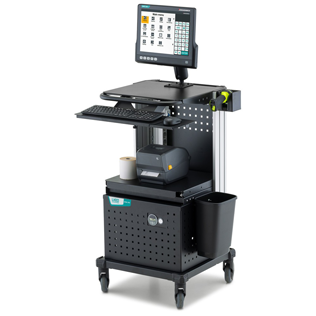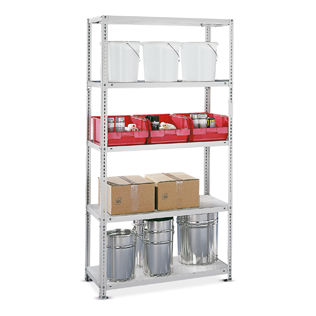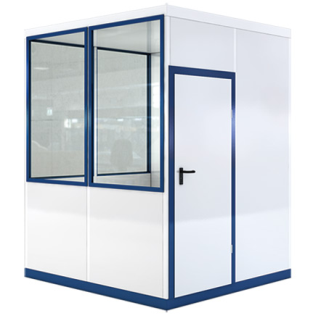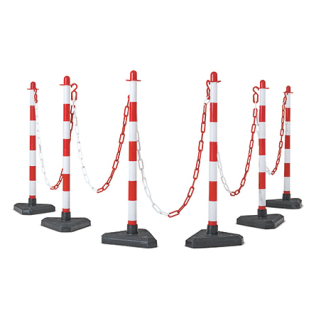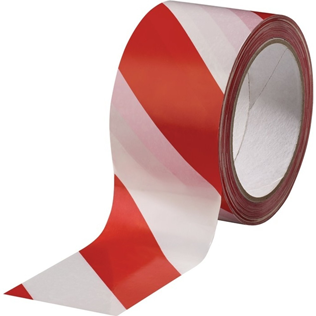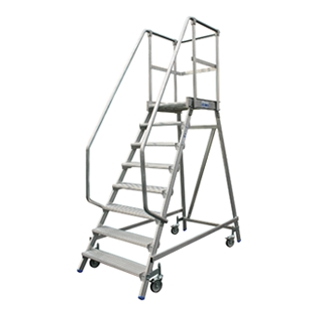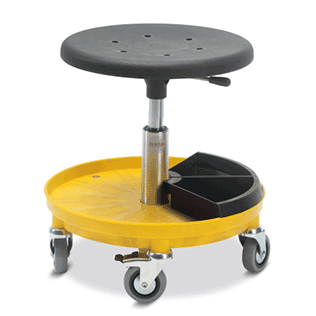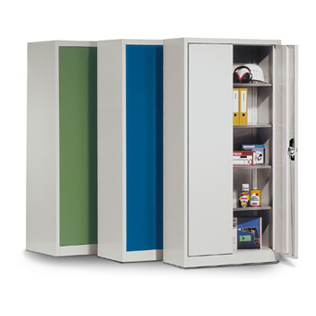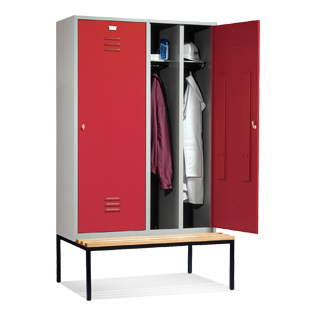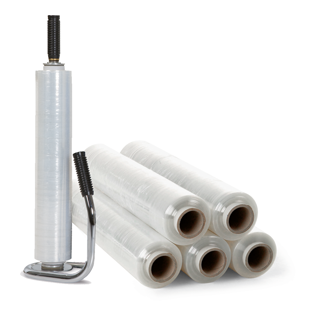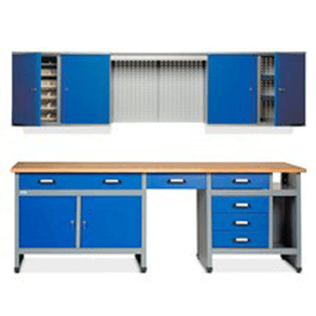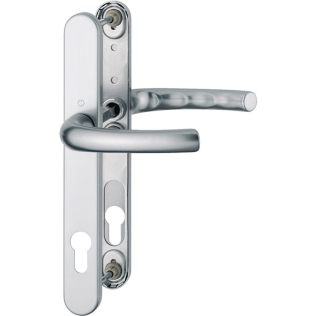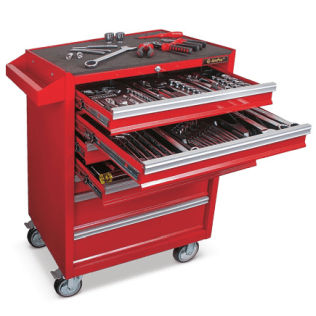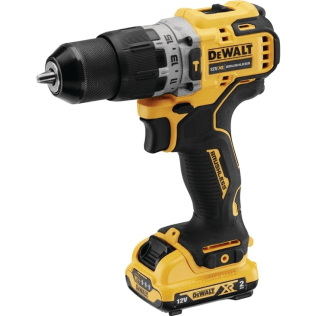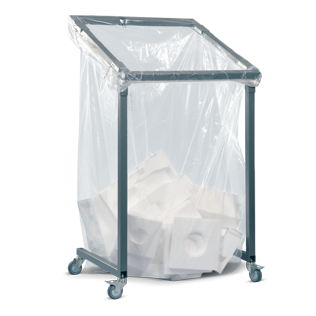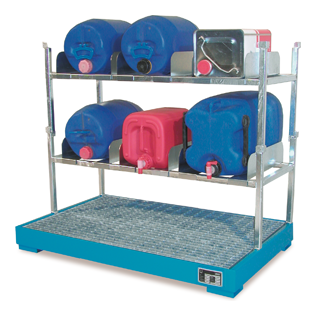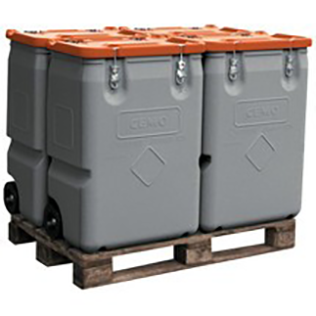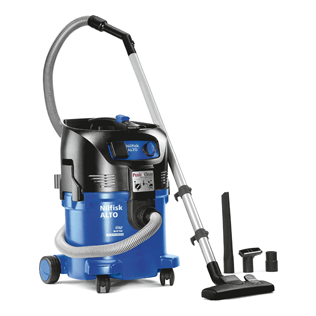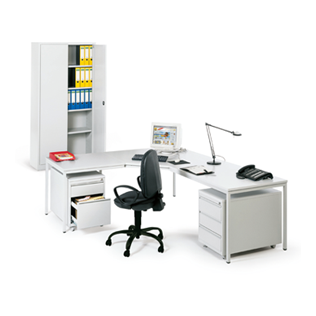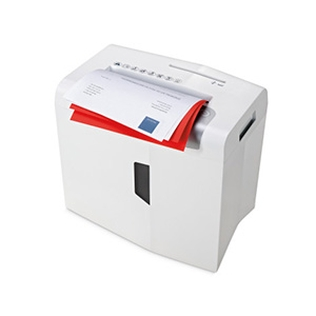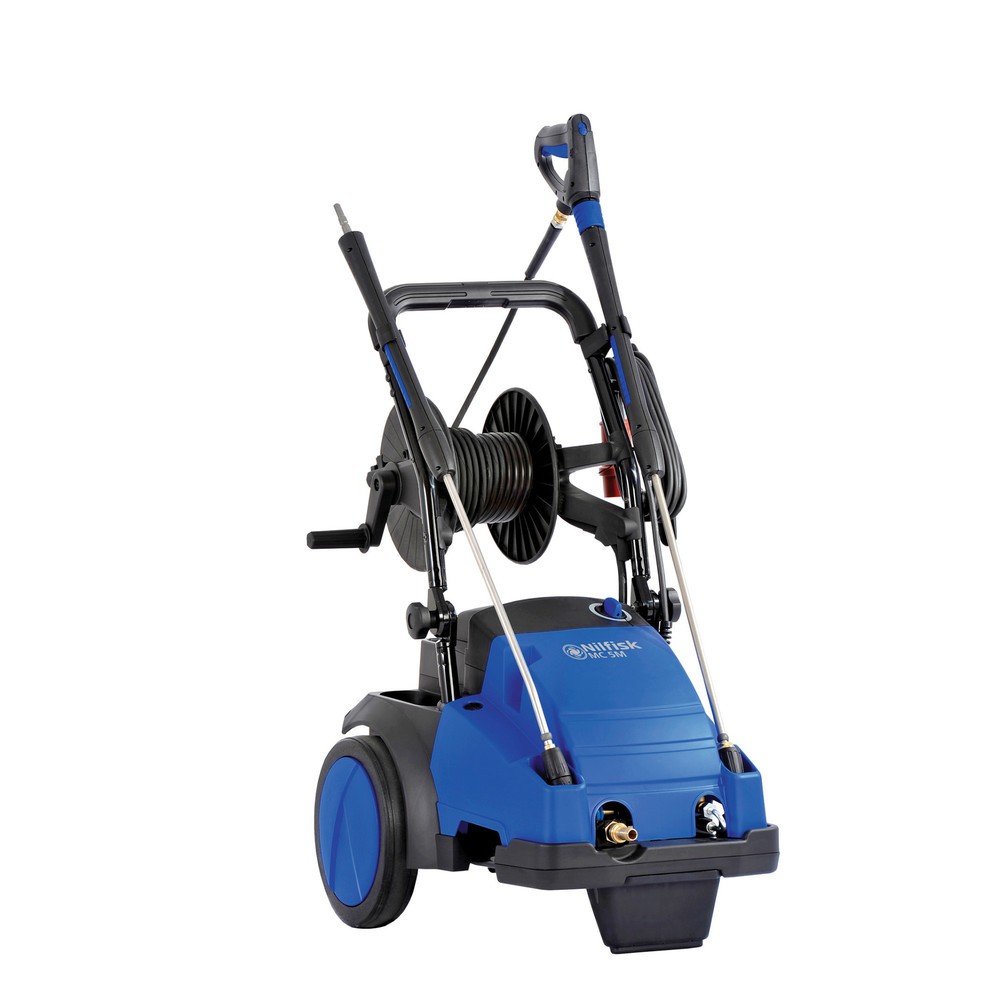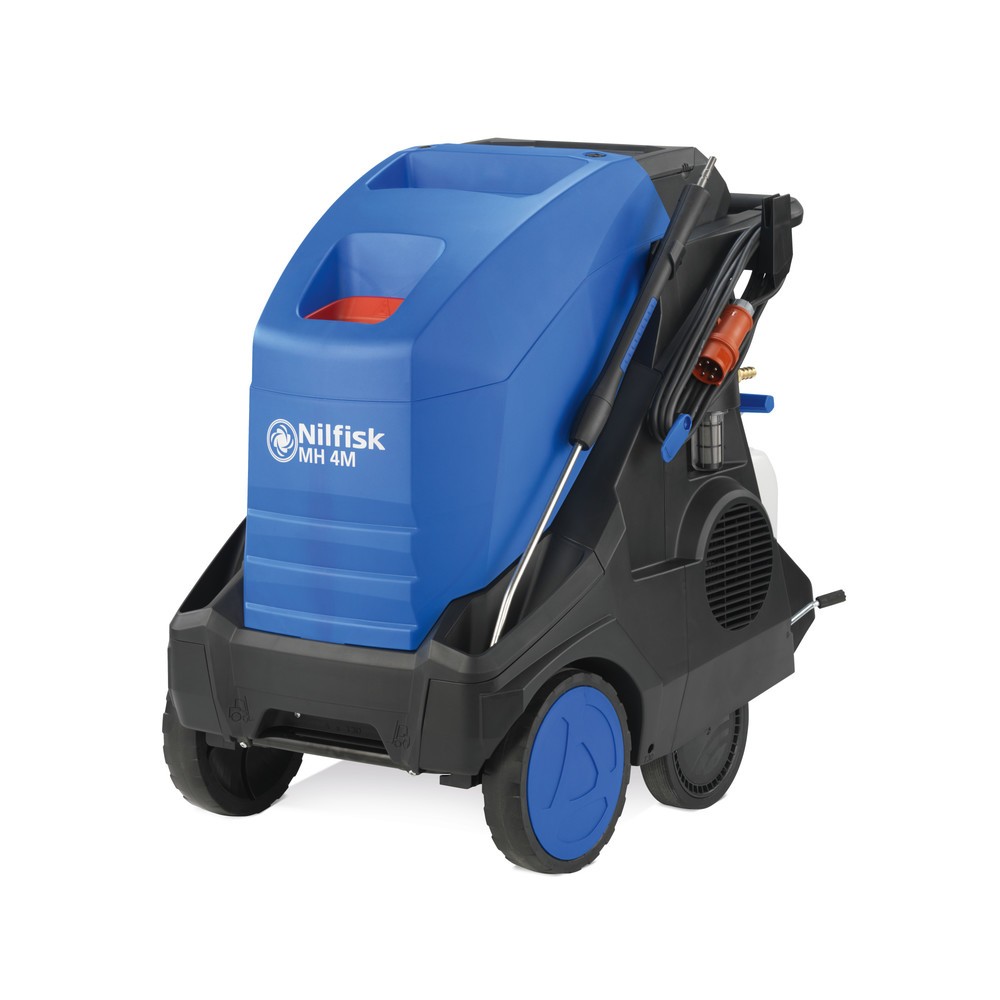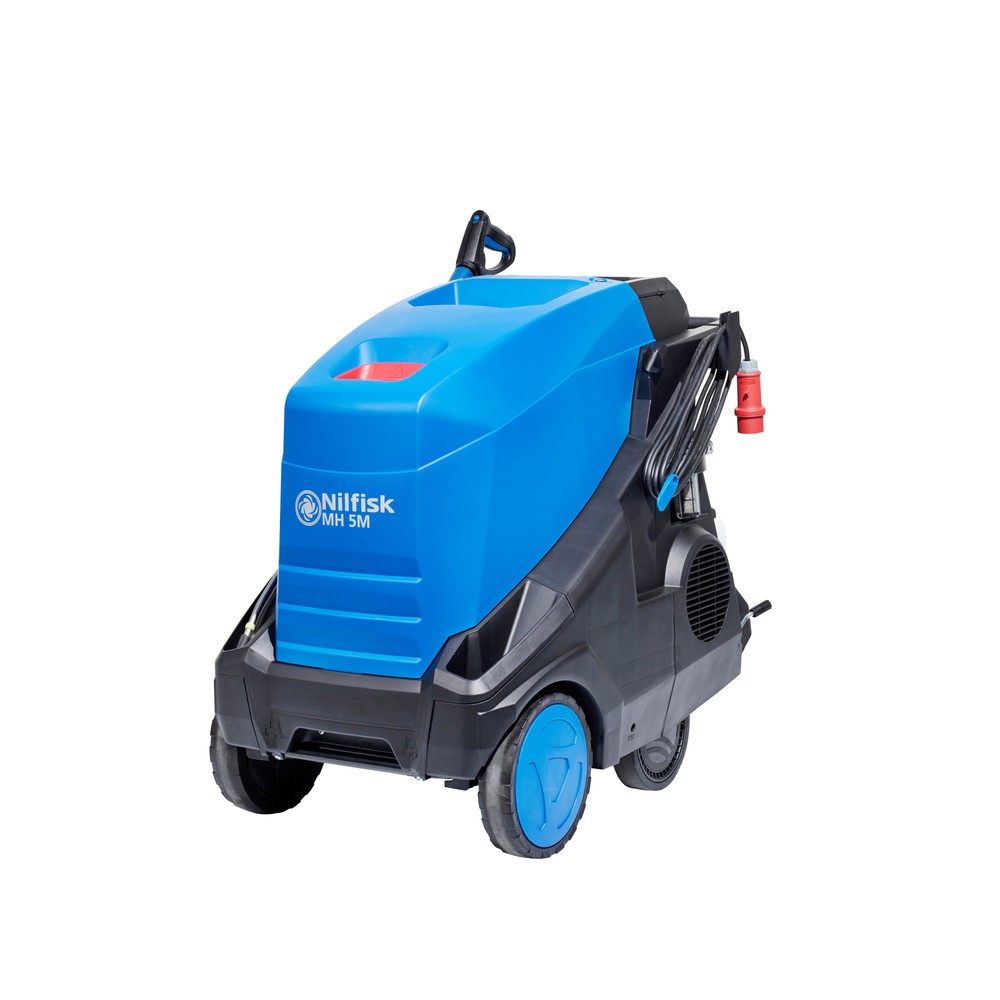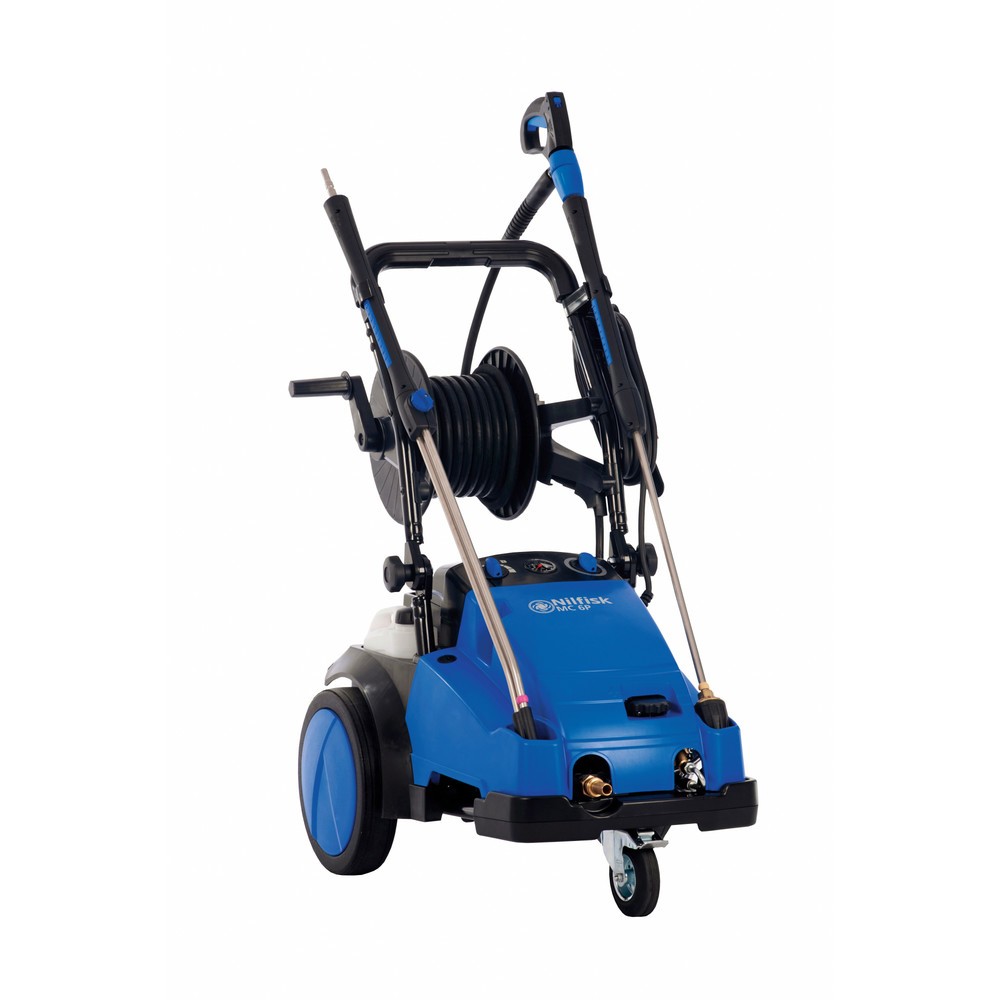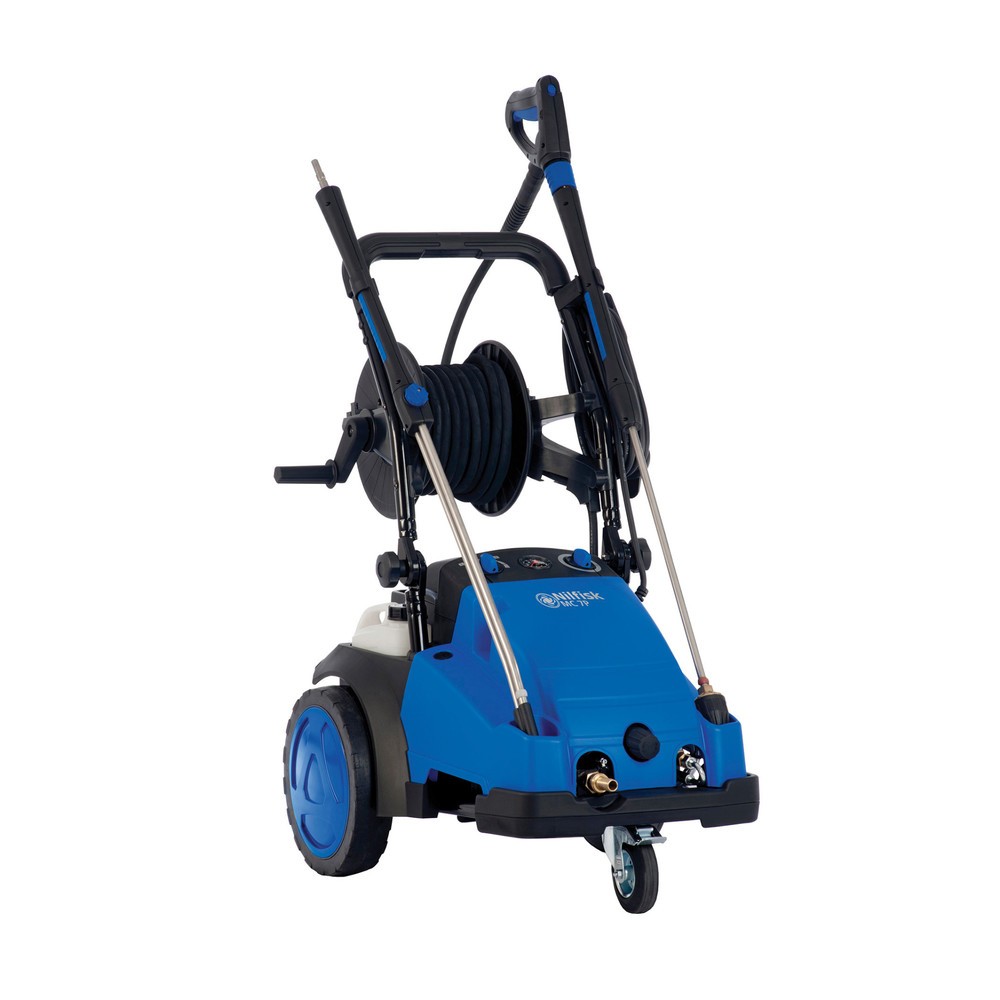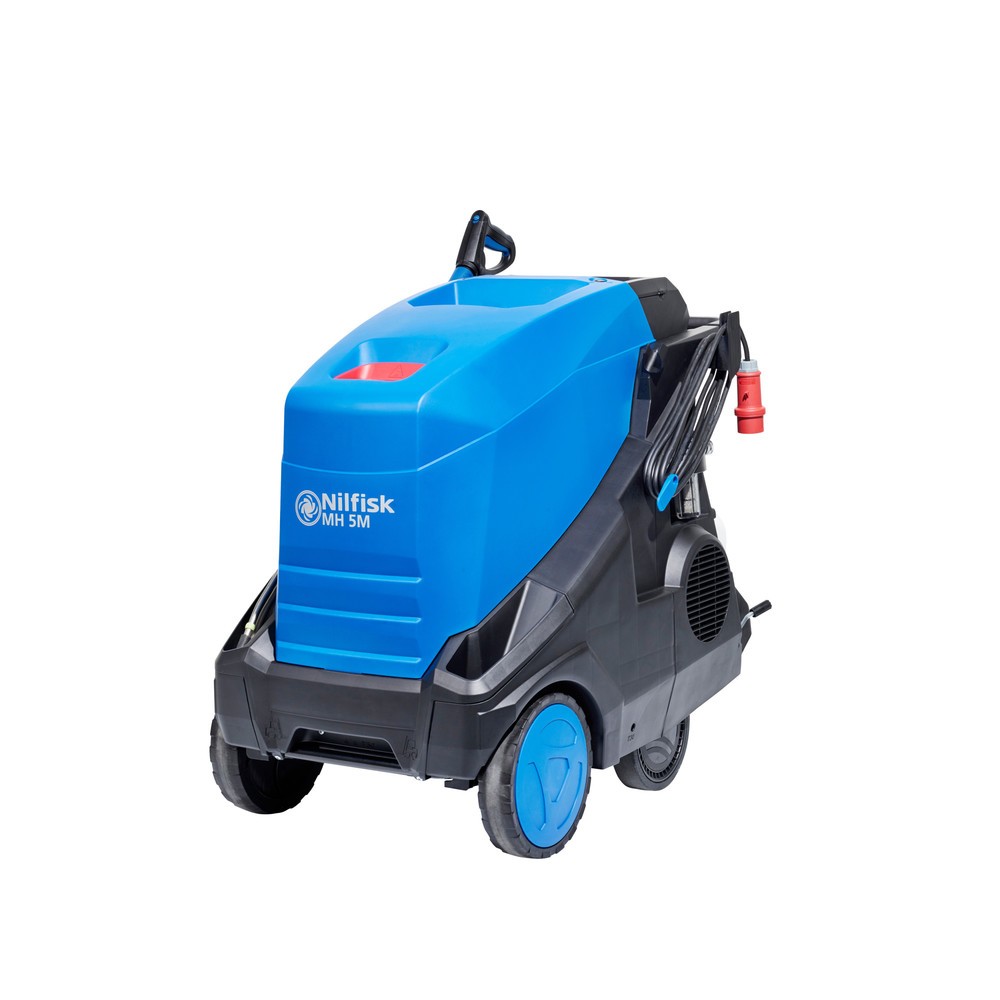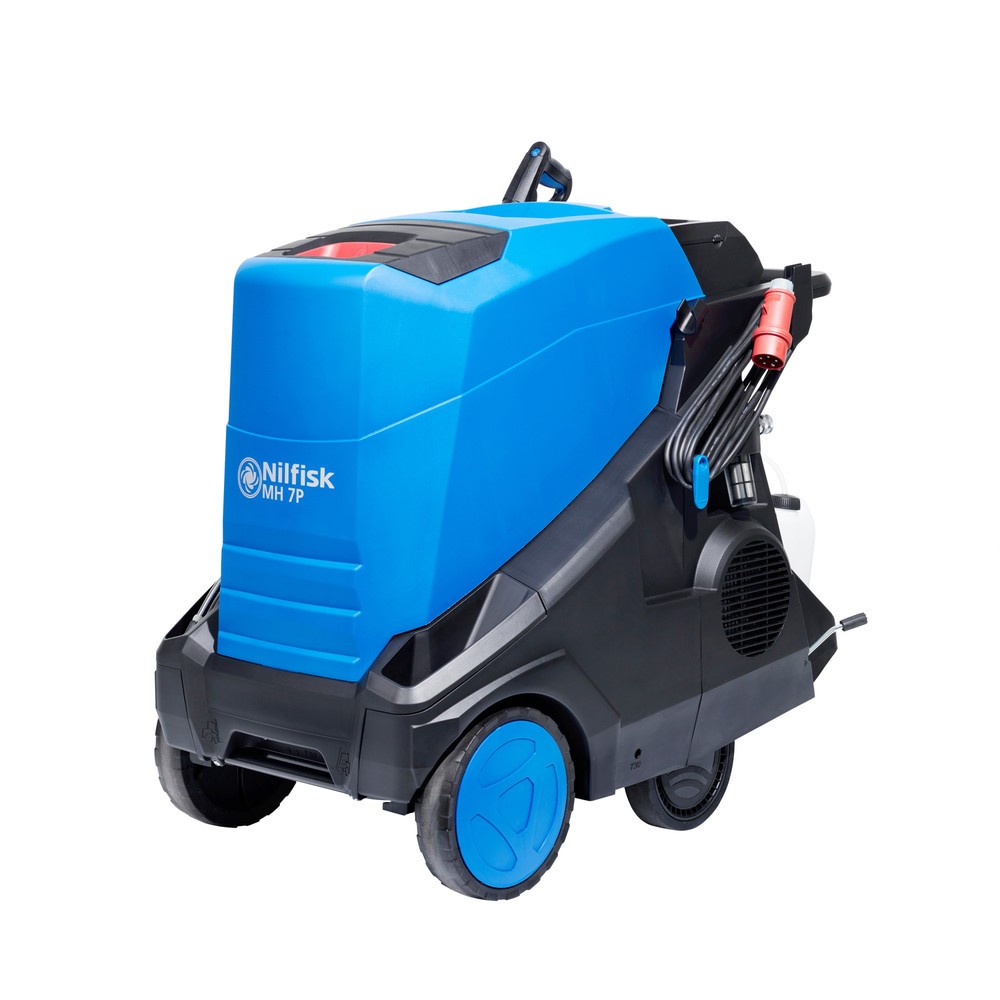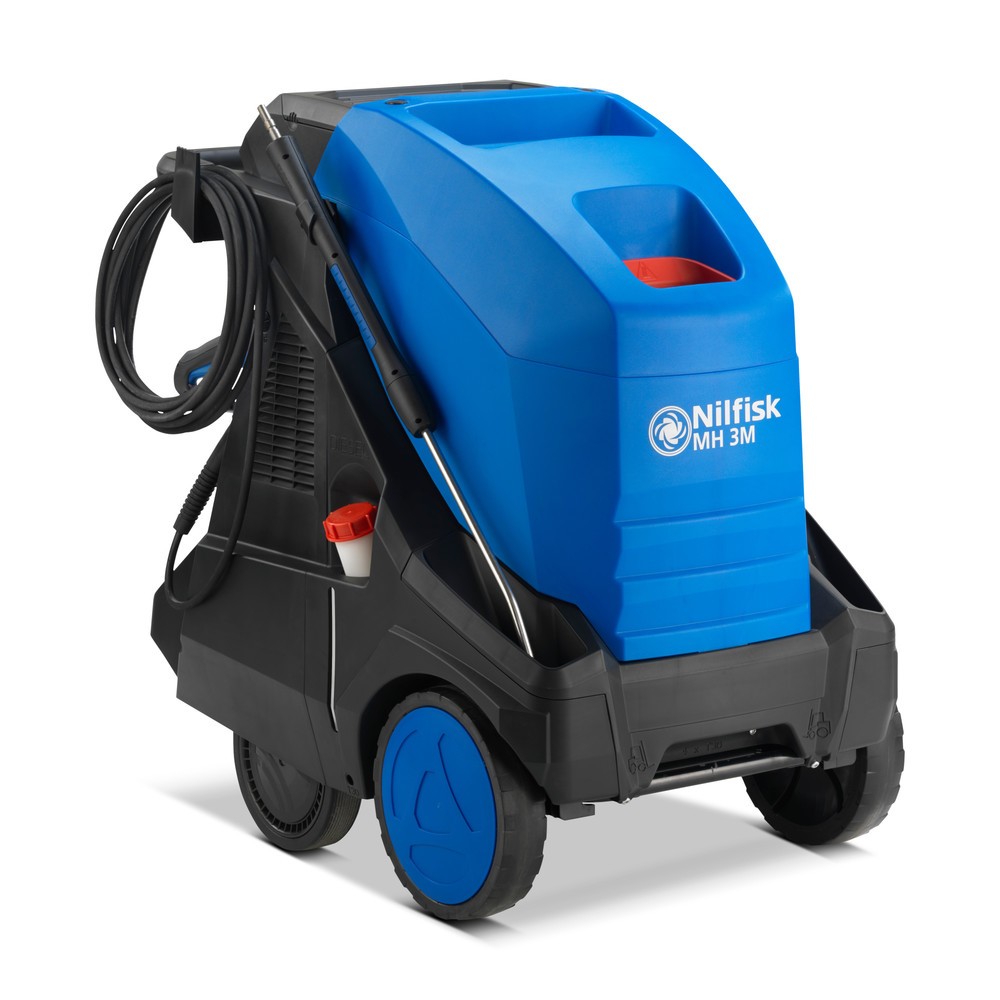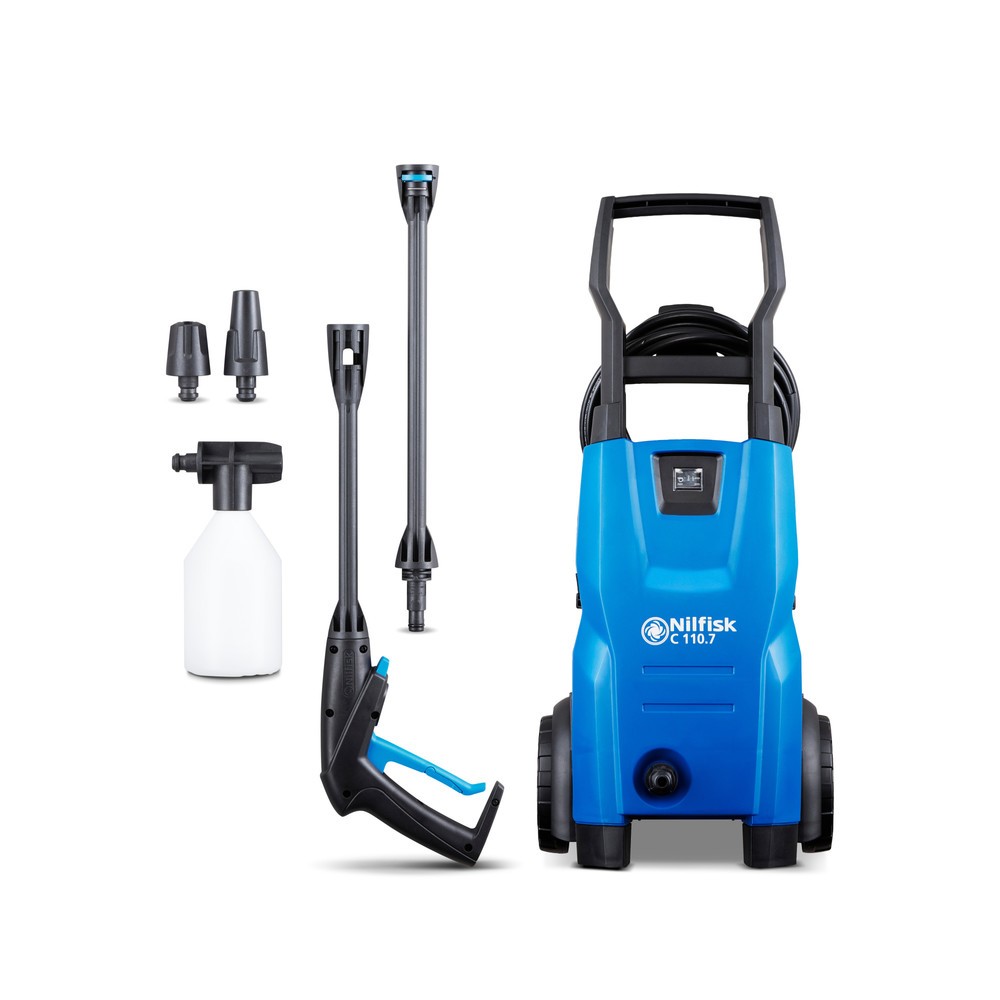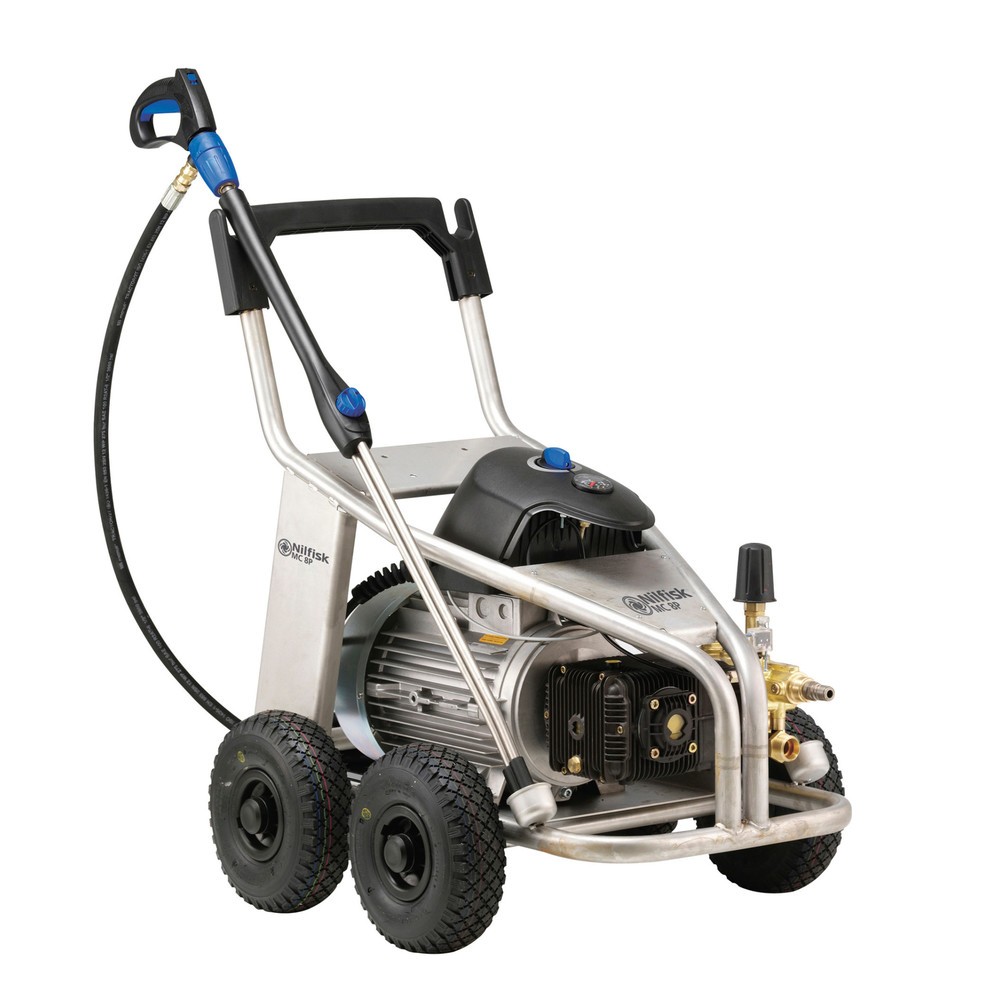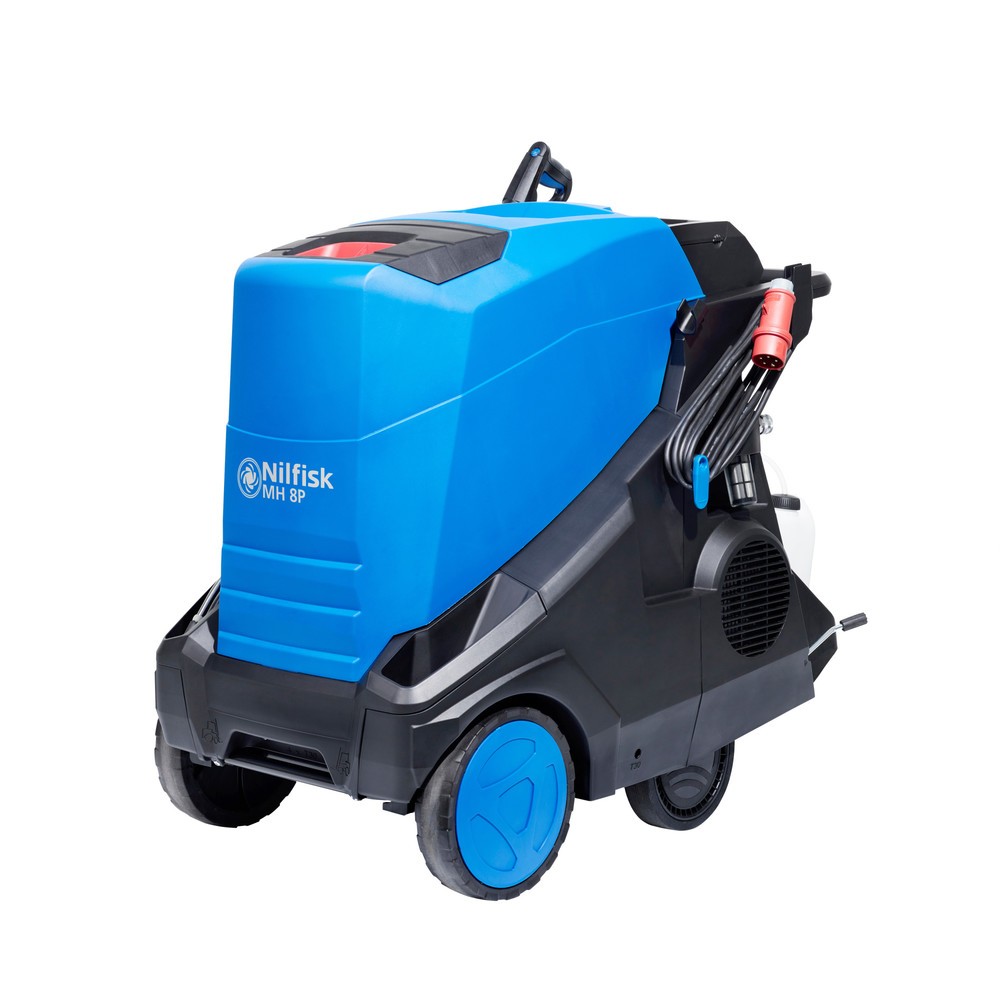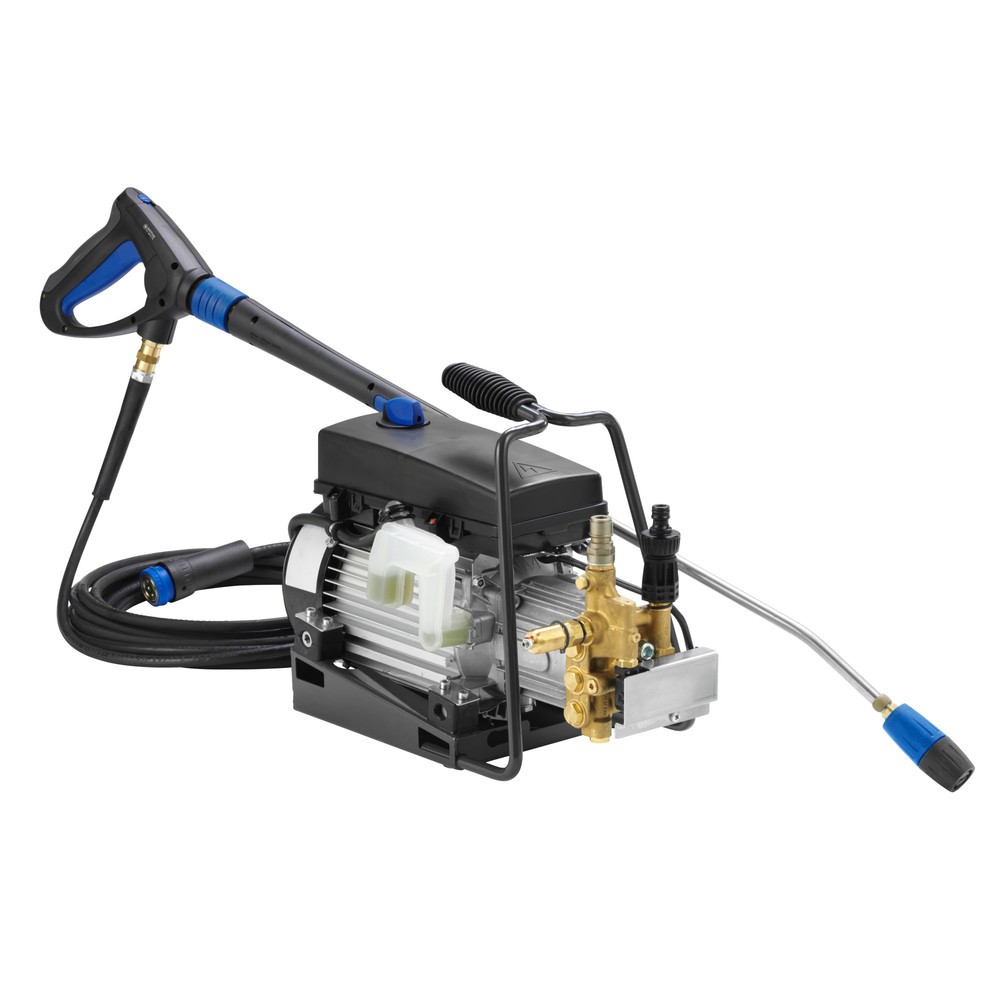Professional pressure washer for unbeatable cleanliness
Professional power washers are ideal for removing tough dirt from many different surfaces. A wide range of power washers are available from our online store with either hot water or cold water operation. This buyer’s guide will help you to choose the best option for your desired application.
1. What are professional pressure washers and what are their cleaning benefits?
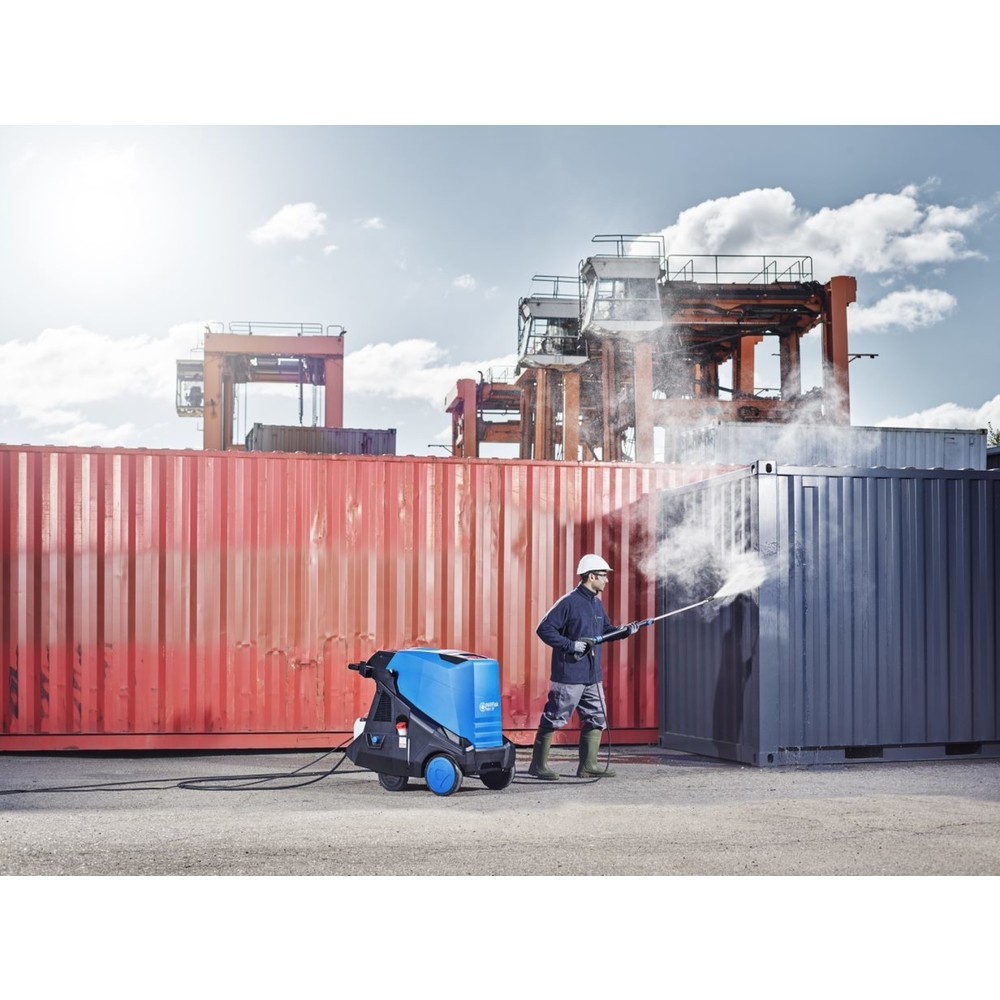
With the help of industrial high-pressure cleaners, stubborn dirt, moss, paint residues and other deposits can be easily removed from most surfaces.
Pressure washers (also referred to as power washers or jet washers) work with extreme water pressures that can reach up to 220 bar, depending on the model. Inside the cleaner, incoming water is compressed by the pistons of a high-pressure pump, increasing the water pressure many times over. As a result, the water comes out of the cleaning nozzle at a very high speed. Depending on the nozzle attachment, you can create bundled or full-coverage water jets.
It is possible to buy a power washer designed to be used with either hot or cold water. Many models are also capable of mixing cleaning agents into the water, making surface maintenance even easier. Standard pressure washers must be connected to a water pipe and a power connection (for mains-powered cleaners). For diesel or petrol-powered high-pressure cleaners, a water connection and suitable fuels are required.
A professional jet washer can offer several advantages over other methods of cleaning:
| Advantages | Details |
|---|---|
| Saves time |
|
| Versatile usage |
|
| Best cleaning results |
|
| Comfortable working conditions |
|
| Greater sustainability |
|
When using a professional pressure washer with hot water or detergents, we highly recommend wearing safety goggles and, if necessary, protective gloves. Depending on the cleaning project, it might also be advisable to wear a respirator. That way, potential injuries, which can be caused by splashing hot water or corrosive cleaning substances, can be avoided.
2. Buy your next pressure washer from us
We offer a wide range of cold and hot pressure washers for almost any application. Our washers are divided into two performance classes:
| Class | Performance | Industrial |
|---|---|---|
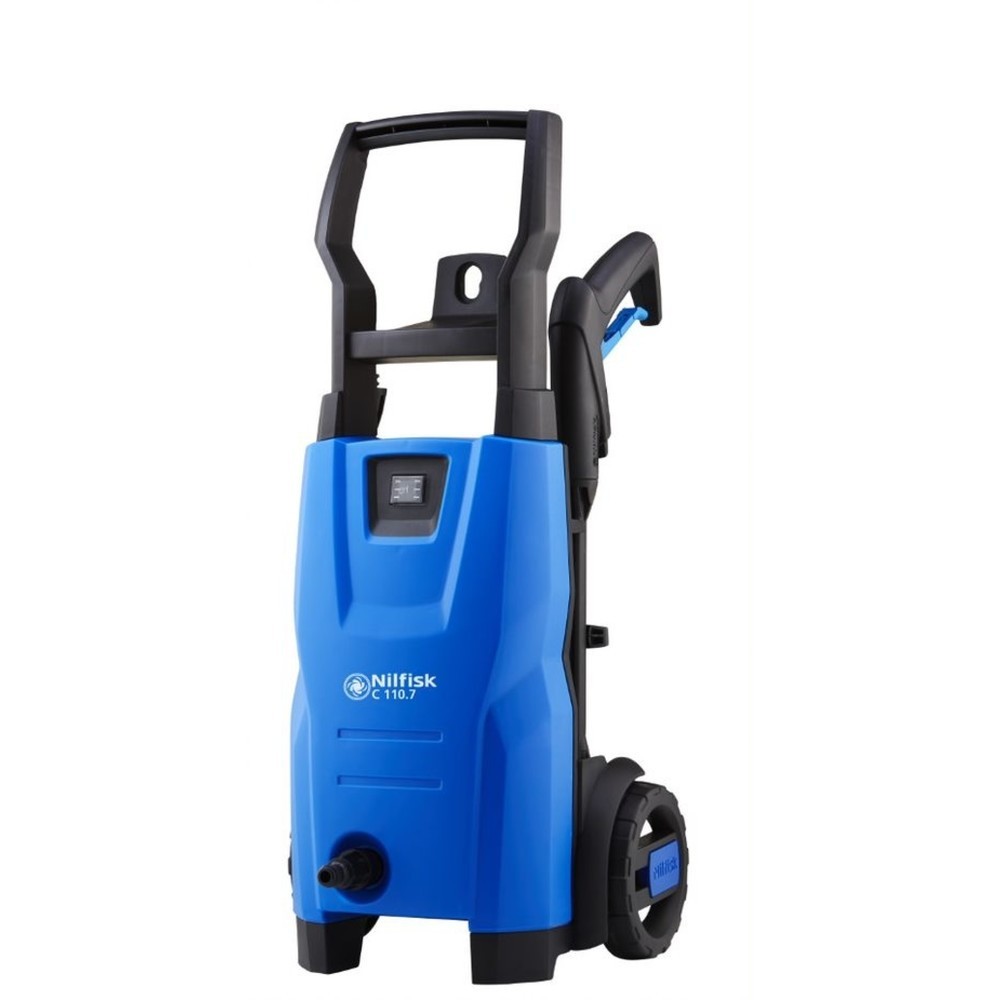 | 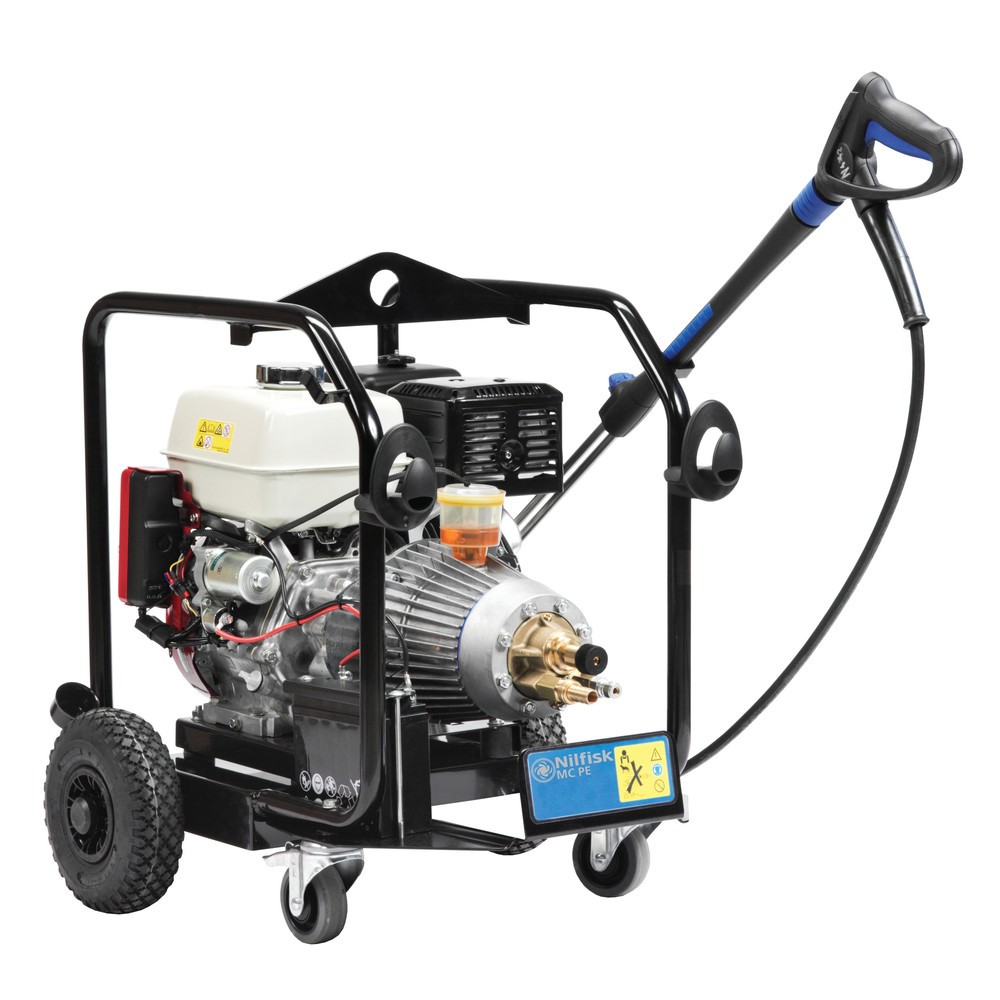 | |
| Pressure | From 10 bar |
Up to 220 bar |
| Conveying output | From 310 l/h |
Up to 2450 l/h |
| Functions (model dependent) |
|
|
| Application |
|
|
Cold-water pressure washer
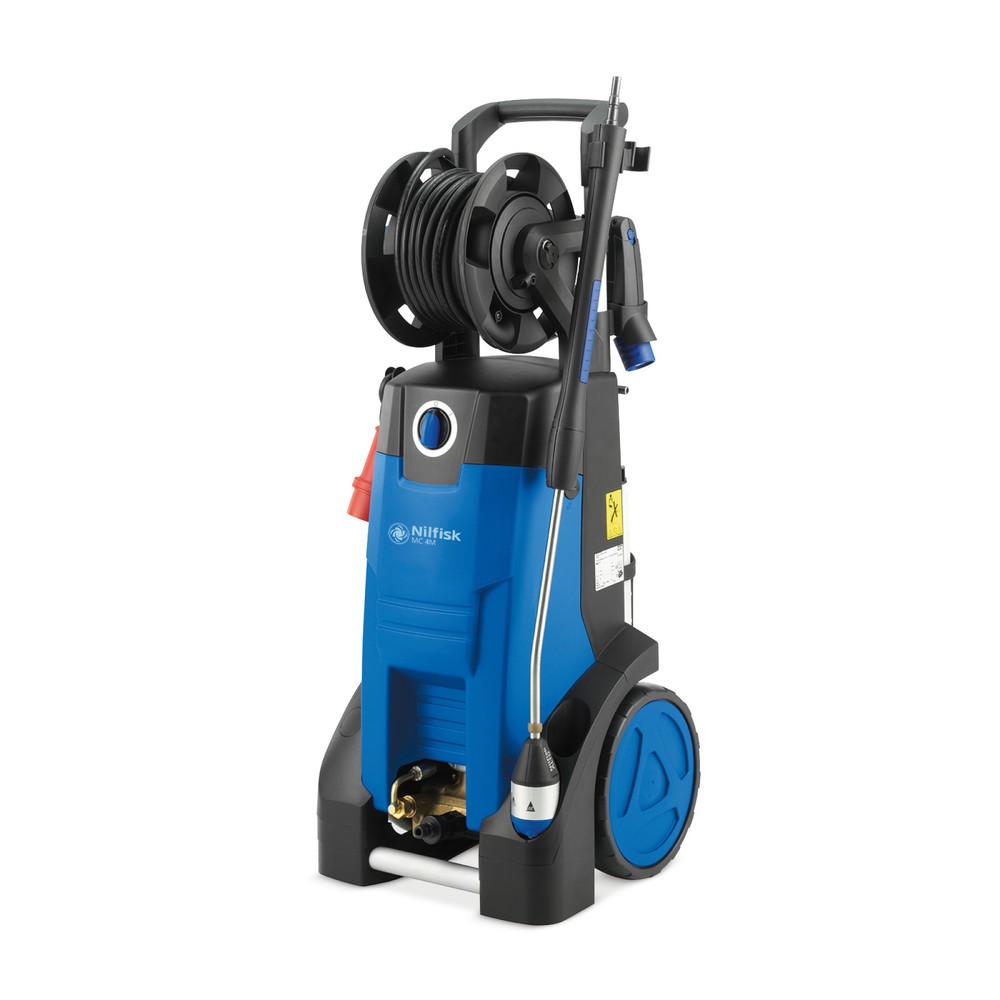
Our cold-water jet washers are ideal for occasional and light cleaning applications in the household or commercial sector. Despite being primarily designed for cold water, it is also possible to operate these devices at temperatures of up to 60 °C: allowing them to be used for many different cleaning tasks, with or without the help of cleaning agents.
Due to their compact design, our pressure washers are also very easy to transport and use. Telescopic handles make cleaning even the most difficult-to-reach sports straightforward.
Some industrial pressure washers can even be mounted on a wall for stationary use. Plus, with the help of quick-release fasteners, nozzles and attachments can be replaced to suit a range of functions.
The brass cylinder heads used on our cold-water high-pressure cleaners are designed to be rust-proof and highly resilient. With a choice of pumps constructed from aluminium, ceramic, or stainless steel, you can depend on a long service life.
The Nilfisk® high-pressure cleaners for professionals are also available from Jungheinrich PROFISHOP with extensive attachments: including nozzle types and sizes made for different surfaces, preventing damage to wood, stone, or ceramic. Depending on the attachment, the jet strength can also be regulated.
Complete pressure washer kits with the following equipment are available:
- High-pressure gun
- Foam sprayer
- Rotary brushes
- Surface cleaner
- Jet tube
- Drain cleaning kit
Advantages and disadvantages of cold-water power washers at a glance:
| Advantages | Disadvantages | |
|---|---|---|
|
|
Hot-water pressure washer
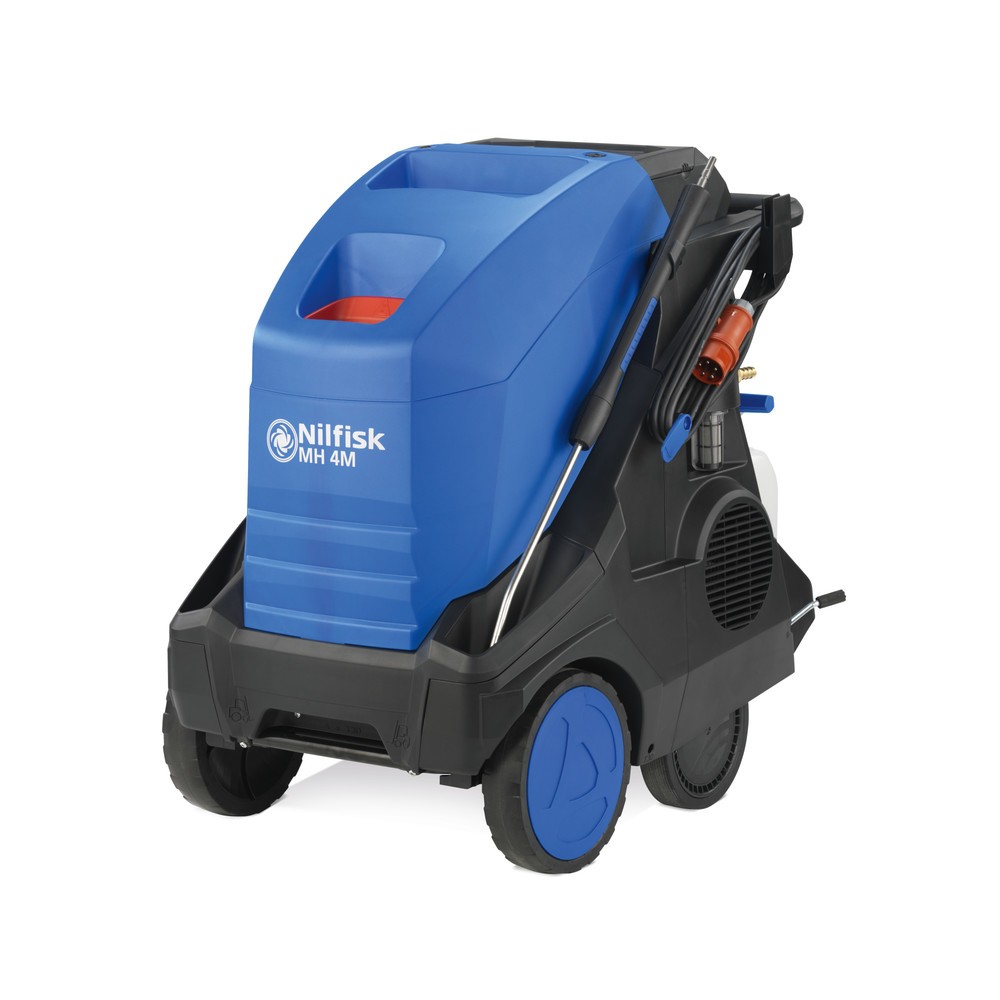
Our hot-water jet washers are ideal for intensive and demanding industrial work, as well as for covering large areas. Depending on the model, our cleaners can be used continuously for up to 6 hours. Efficient ceramic piston pumps and high-pressure jets make it possible to remove even the toughest contaminants or lubricants. At the same time, the water, which is heated to over 60 °C, can be used to reliably disinfect rooms and work equipment.
Integrated heat exchangers make our hot-water models particularly economical with an efficiency of over 92%. This improves energy-saving over time, reducing costs and environmental impact. In addition, fuel and oil levels can be monitored at any time and an automatic warning system prevents damage, should the levels become too low.
Advantages and disadvantages of hot-water jet washers at a glance:
| Advantages | Disadvantages | |
|---|---|---|
|
|
3. Which pressure washer should I buy? How to choose the right model
You can buy pressure washers from Jungheinrich PROFISHOP in various designs. In addition, you can choose from numerous compatible components. To help you find a suitable device for your cleaning needs, there are a few important things to consider.
Application: Substrates and types of dirt
Our hot and cold-water pressure washers are suitable for the following applications:
| Cold-water pressure washer | Hot-water pressure washer | |
|---|---|---|
| Suitable for: |
|
|
| Not suitable for: |
|
|
Please note: Sensitive surfaces and objects should only be treated with suitable cleaners or attachments. The water pressure from spray lances or jet nozzles can quickly damage soft, natural materials or lead to unwanted surface erosion. Surface cleaners, flat jet nozzles or special attachments might be more suitable.
Stationary or mobile use
Some of our industrial cleaners can be used in a stationary or mobile configuration, depending on the equipment, size and weight:
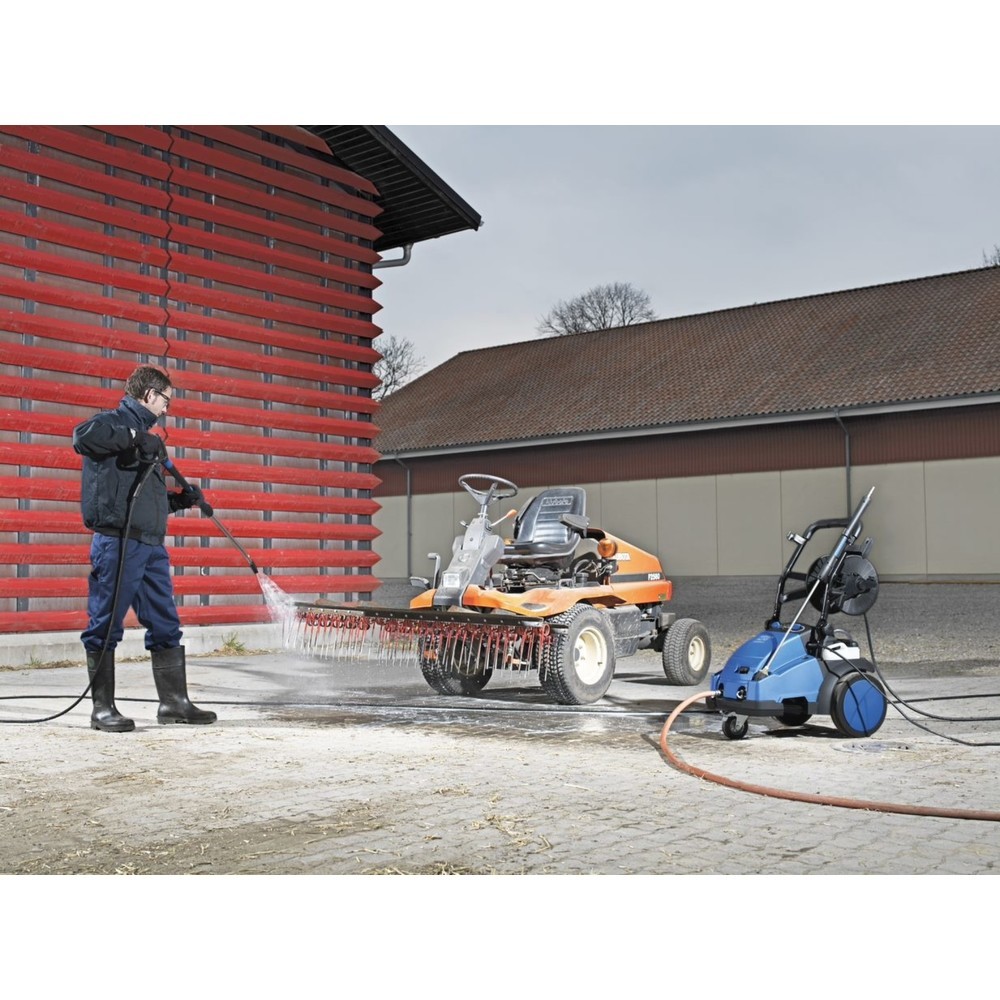
- Stationary use: Our large professional pressure washers with steel frames are best for fixed locations. Due to their size and weight, they may need to be moved into position using a powered vehicle or moving equipment. This makes them much less suitable for applications without a fixed operating space. With the help of a suction mechanism, mains water, as well as water from tanks or basins can be used. The considerable pressure of the hoses also allows for a generous working radius.
- Mobile use: Mobile power washers are typically far lighter and smaller, designed for flexible working. The drawback is that they do not offer the same power and performance of the larger, stationary models. A long, high-pressure power cable (up to 10m length) offers a wide range of motion.
Power type
In most of the models in our range, the motor and high-pressure pump form a single robust unit: this makes the cleaning devices particularly durable and powerful. We offer options for both mains and combustion engine models:
| Power type | Details | Application |
|---|---|---|
| Internal combustion engine |
|
|
| Electric motor |
|
|
Capacity and pressure
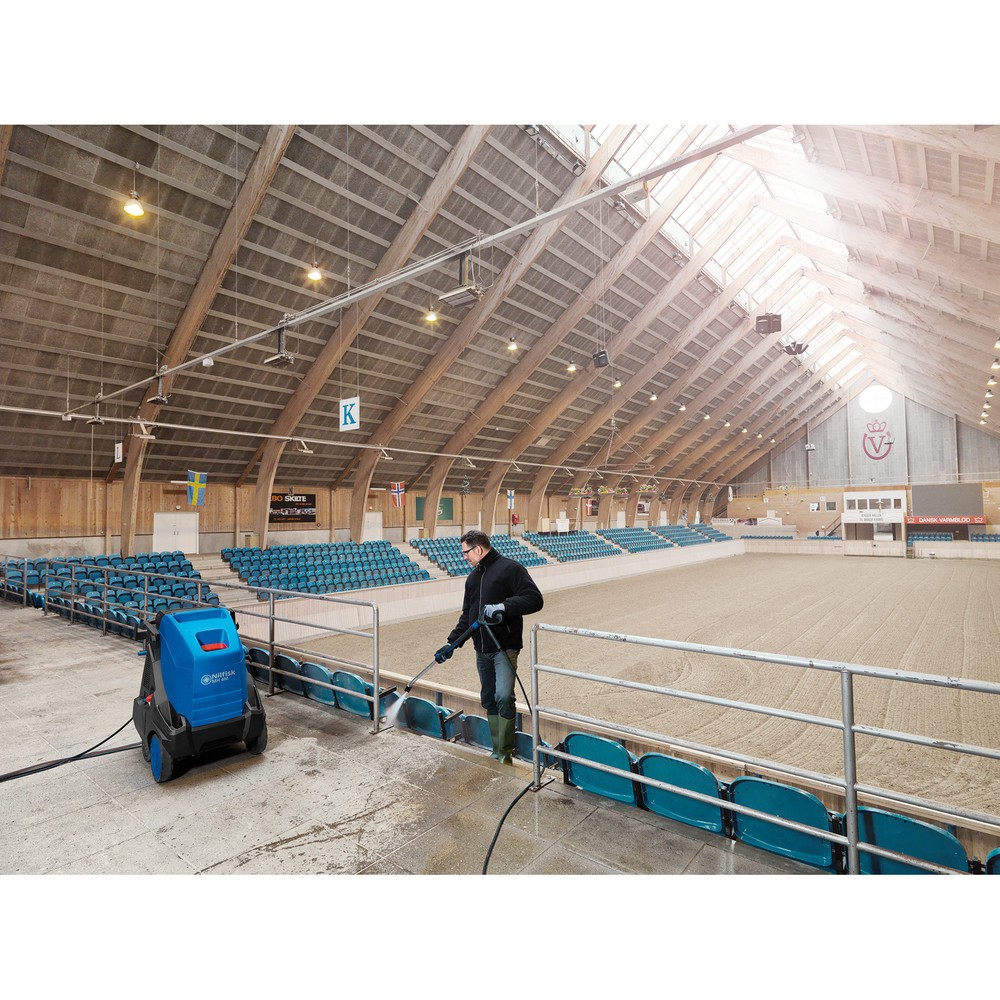
Our power washer tools come in a range of water capacity and pressure options. Both parameters are essential to consider when looking at your desired applications.
For household cleaning or for relatively easy-to-remove dirt, pressure washers with flow rates of around 400L per hour are typically sufficient. Such cleaning devices can reach a pressure range of 80 to 120 bar and offer great performance for everyday tasks.
High-pressure cleaners for professional use, as well as large-scale or demanding cleaning applications in trade, industry or on construction sites, offer a flow rate of over 1500L per hour, with a maximum pressure of up to 220 bar. This allows for the removal of even the trickiest grime and contaminants.
4. FAQ about pressure washers
When using hot or cold jet washers, highly pressurised water and dirt can create a health risk. This danger is compounded when using powerful cleaning agents, particularly hot water or when removing bacteria, pollutants or on rough surfaces. It is important to wear suitable protective clothing when cleaning. At the very least, safety goggles should be worn at all times. Protective gloves and even a respirator might also be advisable, depending on the use case.
A variety of cleaning agents can be used with power washers. Which cleaner is best depends on the type of work and the nature of the surface to be cleaned. With all-purpose or universal cleaners, you can dissolve and remove lubricants and mineral dirt, for example. On the other hand, specific cleaning solutions are suitable for more demanding tasks or sensitive surfaces. These are specially adapted to the materials. For example:
- Stone and façade cleaner
- Wood & patio cleaner
- Plastic cleaner
- Car shampoo cleaner
- Oil and grease removers
Most cleaning agents can be used with standard pressure washers. However, you should never pour washing-up liquid, or other substances not designed specifically for pressure washing, as foam can drastically reduce effectiveness. Instead, washing-up liquid can be first applied to a surface and then lathered and rinsed with the jet cleaner.
Soft and natural surfaces can be quickly damaged if incorrectly using a pressure washer. This can be avoided by using suitable accessories. With attachments such as patio or surface cleaners, as well as suitable nozzle types and sizes, you can prevent damage to certain, at-risk surfaces. Similarly, foam nozzles and soft rotary brushes are suitable for sensitive car paint. If cleaning plaster, a low water pressure level is highly recommended.
To ensure that the jet washer itself is not damaged, the pressure hose should always be completely unrolled and free of any kinks.
For household cleaning or easy-to-remove dirt, professional high-pressure cleaners with 80 to 120 bar are more than sufficient. These cleaning devices offer flow rates of around 400L per hour, plenty to achieve good cleaning results.

